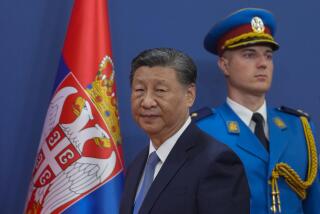Chinese Premier Admits Setbacks Over Past Year
- Share via
BEIJING — What a difference a year makes.
Just 12 months ago, Zhu Rongji made a splash at his first news conference as premier of the world’s most populous nation. Zhu spoke candidly and even joked a bit as he unveiled a series of ambitious initiatives intended to deepen China’s market-oriented reforms.
But at his return engagement Monday, a more somber Zhu found himself promoting a country with a flagging economy, defending it against accusations of spying and pleading for patience from critics of its human rights record.
“The past year was extremely difficult,” he said somewhat ruefully, addressing reporters in a wrap-up of the annual session of China’s National People’s Congress.
On the political front, Zhu--who is due to visit the U.S. on April 8--issued the highest-level dismissal yet of allegations that China’s Communist regime stole nuclear secrets through a spy at the Los Alamos National Laboratory in New Mexico. Investigators say the technology may have helped China miniaturize the warheads on its small contingent of missiles.
“China relied on its own to develop the atomic bomb, the hydrogen bomb and man-made satellites. China is capable of developing any missile technology--it’s only a matter of time,” Zhu said. “. . . Why should China have taken such moral and political risks to steal military secrets from others?”
He blamed an “anti-China wave” and partisan politics in Washington for the sharp increase in criticism of Beijing.
“China-U.S. relations have been victimized by the internal struggle going on in the United States,” said Zhu, the highest-ranking Chinese official to journey to the U.S. since President Clinton’s historic visit here in June.
Zhu predicted a “warm reception” from the White House.
“I don’t think my visit will be like stepping onto a minefield,” he said, but added, “I do expect to encounter some unfriendly, hostile [attitudes].”
In Washington on Monday, the CIA announced it was convening a nongovernmental panel to examine whether a suspected spy at Los Alamos had provided China secrets on nuclear warhead design. CIA Director George J. Tenet named retired Adm. David Jeremiah to head the panel.
The Clinton administration also came in for criticism from Sen. Bob Kerrey (D-Neb.), the ranking Democrat on the Senate intelligence committee. He disputed claims that officials repeatedly had briefed Congress on the alleged incidents at Los Alamos.
Committee Chairman Sen. Richard C. Shelby (R-Ala.), who along with Kerrey was briefed by Tenet, proposed that the government place a moratorium on foreigners visiting U.S. weapons labs and Americans visiting those of other countries.
“The security of the labs has been too loose for too long,” Shelby said.
Along with the espionage charges, Zhu, while in Washington, is expected to discuss human rights and protracted negotiations over China’s accession to the World Trade Organization.
Chinese-U.S. ties have hit a low since Clinton’s trip, dragged down by China’s escalating trade surplus, the Clinton administration’s plan to develop a regional missile-defense system that might include Taiwan and Beijing’s stepped-up campaign against political dissent.
On Monday, a Hong Kong-based group reported that Chinese police had detained another member of the China Democracy Party, a group of dissidents who tried unsuccessfully last year to register Communist China’s first opposition party.
Zhu acknowledged flaws in China’s human-rights record but said it “improves every day.”
He pleaded for patience as China tries to establish a civil society and the rule of law after thousands of years of feudal and colonial rule.
“Actually, I’m more impatient than you are,” he said, drawing scattered laughs from the crowd.
Although he leavened his remarks with humor, and even with references to Rousseau and Shakespeare, Zhu admitted that the past year has been something of a disappointment, particularly because some of the initiatives announced last March have sputtered. They included an overhaul of China’s moribund state sector and reform of the housing system.
He held out the hope that China may accede soon to the WTO, and even pronounced China ready to make “the biggest concession it can” to gain entry.
“Black hair has turned white” after 13 years of talks, he said. “It’s time to conclude these negotiations.”
But few analysts expect a major breakthrough on his visit to the U.S.
Several of China’s key industries remain heavily protected, including its burgeoning telecommunications market. Zhu reiterated that his government will break the huge monopoly of China Telecom and open the door to foreign investors.
Overall, the economy has turned sluggish after years of double-digit growth. Two weeks ago, Zhu set a growth target of 7% this year, predicated on heavy government spending that will push the budget deficit more than 50% higher.
Beijing also is relying on the private sector. As expected, reversing decades of official Communist dogma, the National People’s Congress on Monday amended the constitution to enshrine the nonstate sector as “an important component” of the “socialist market economy.”
There are signs that foreign investment is tailing off, particularly after the bankruptcy of the Guangdong International Trust and Investment Co. with $4 billion in debt, much of it owed to overseas creditors.
International credit agencies such as Standard & Poor’s, have lowered their ratings of similar Chinese financial institutions in expectation of further collapses, which Zhu called “too pessimistic.”
Times staff writers Paul Richter and Art Pine in Washington contributed to this report.
More to Read
Sign up for Essential California
The most important California stories and recommendations in your inbox every morning.
You may occasionally receive promotional content from the Los Angeles Times.














